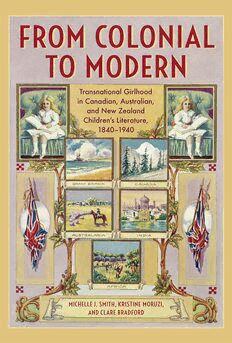
From Colonial to Modern: Transnational Girlhood in Canadian, Australian, and New Zealand Literature, 1840-1940 PDF
Preview From Colonial to Modern: Transnational Girlhood in Canadian, Australian, and New Zealand Literature, 1840-1940
FROM COLONIAL TO MODERN Transnational Girlhood in Canadian, Australian, and New Zealand Children’s Literature, 1840–1940 This page intentionally left blank FROM COLONIAL TO MODERN Transnational Girlhood in Canadian, Australian, and New Zealand Children’s Literature, 1840–1940 MICHELLE J. SMITH KRISTINE MORUZI CLARE BRADFORD UNIVERSITY OF TORONTO PRESS Toronto Buffalo London © University of Toronto Press 2018 Toronto Buffalo London utorontopress.com Printed in the U.S.A. ISBN 978-1-4875-0309-3 Printed on acid-free, 100% post-consumer recycled paper with vegetable-based inks. ________________________________________________________________ Library and Archives Canada Cataloguing in Publication Smith, Michelle J., 1979–, author From colonial to modern : transnational girlhood in Canadian, Australian, and New Zealand children’s literature, 1840–1940 / Michelle J. Smith, Kristine Moruzi, Clare Bradford. Includes bibliographical references and index. ISBN 978-1-4875-0309-3 (hardcover) 1. Children’s literature, Canadian – History and criticism. 2. Children’s literature, Australian – History and criticism. 3. Children’s literature, New Zealand – History and criticism. 4. Girls in literature. 5. Femininity in literature. 6. Sex role in literature. 7. Imperialism in literature. 8. National characteristics, British, in literature. 9. Australian literature – British influences. I. Moruzi, Kristine, author II. Bradford, Clare, author III. Title. PR9080.5.S65 2018 820.9'3523 C2017-907195-5 ________________________________________________________________ This book has been published with the support of the School of Communication and Creative Arts, Deakin University. University of Toronto Press acknowledges the financial assistance to its publishing program of the Canada Council for the Arts and the Ontario Arts Council, an agency of the Government of Ontario. an Ontario government agency un organisme du gouvernement de l’Ontario Funded by the Financé par le Government gouvernement of Canada du Canada Contents List of Illustrations vii Acknowledgments ix 1 Introduction 3 Section One – Empire and Transnational Flows 2 Colonial Girls’ Print Culture 23 3 Girlhood in the British Empire 47 Section Two – National and Transnational Dynamics 4 The Colonial and Imperial Family 73 5 Environment and the Natural World 97 6 Race and Texts for Girls 117 Section Three – Modernity and Transnational Femininities 7 Work and Education 147 8 Girlhood and Coming of Age during the First World War 178 9 Modernity and the Nation 201 10 Conclusion 231 Bibliography 241 Index 259 This page intentionally left blank Illustrations 3.1 Cover of The Empire Annual for Australian Girls, 1910 61 3.2 Masthead from The Girls’ Empire, 1902 63 4.1 “Mother said, ‘Tell your Uncle Robert that I have always loved him,’” 1911 81 4.2 “They smiled at her confidently, expectantly,” 1920 94 5.1 Frontispiece of A Little Bush Maid, 1910 111 5.2 “We laughed and laughed till it hurt to go on any longer,” 1917 115 6.1 “Hector bringing the Indian girl,” 1852 127 6.2 “We played through the immortal legend,” 1925 136 6.3 “Sajo ran home with Chilawee in her arms,” 1935 141 7.1 Frontispiece of With Beating Wings, 1913 163 7.2 “It’s a big world,” 1929 173 7.3 “Babes! What in the world are you doing?” 1927 175 8.1 “They strolled across the grass to the railings, and looked up and down the tan ribbon of Rotten Row,” 1916 183 8.2 “I am one of those who want to help fight – if you will let me,” 1919 186 8.3 Cover of The School Paper for Grades VII and VIII, 1916 193 8.4 “Women Packing Garments for Men of H.M.S. ‘New Zealand,’” 1916 198 9.1 Advertisement for Petone Bathing Costumes, 1924 209 viii Illustrations 9.2 Frontispiece of Golden Fiddles, 1928 212 9.3 “Bed-time, sleepy boy!” 1918 218 9.4 “I’se a young New Zealander, too!” 1925 222 9.5 “The Dew on the Grass,” 1930 224 9.6 “To a Little Eskimo,” 1926 227 Acknowledgments This project was made possible by a Discovery Grant (DP110101082) funded by the Australian Research Council, incorporating an Australian postdoctoral fellowship for Michelle Smith at the University of Melbourne. Kristine Moruzi’s research was funded by a Grant Notley Memorial Post- doctoral Fellowship from the University of Alberta. We also enjoyed the support and collegiality of the staff working in literary studies in the School of Communication and Creative Arts at Deakin University. The research for this project took us to a variety of libraries. We ben- efited from valuable assistance at the Toronto Public Library, the State Library of Victoria, and the National Library of New Zealand. Thanks are also due to some of the fabulous scholars who are working in the field of colonial girls’ studies, including Beth Rodgers, Susan Cahill, Sarah Emily Duff, Kristine Alexander, and Laura Ishiguro. We would also like to offer special thanks to Cecily Devereux at the University of Alberta and Eliza- beth Braithwaite at Deakin University. University of Toronto Press has been incredibly supportive throughout the long gestation of this project. We would like to thank Mark Thomp- son for helping to bring the project through to publication.
